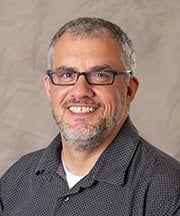Last Updated on February 27, 2019 by
By Jacob Adney, MD Candidate, Saint Louis University School of Medicine
Mr. Dave Etler is an Administrative Services Coordinator at University of Iowa Roy J. and Lucille A. Carver College of Medicine. He is also co-host of the Short Coat Podcast, which discusses the current events, social aspects, and people in the thrilling and exciting torrent that is the medical field. He was born in Massachusetts, raised in Falmouth on Cape Cod, and is the intensely proud father of two and husband of one.
Please summarize your role at the medical school.
I see my role in this medical school as being a cheerleader for medical students. Medical education has many challenges, both on the institutional side and on the learners’ side. When I can point a student in the right direction, or offer them a way to achieve something without sacrificing who they fundamentally are—whether it’s by podcasting, offering an opportunity for self-expression through art, or just by helping them navigate the hierarchy of medical education, I can go home feeling good about my day.
I’m also a problem solver for the student affairs and curriculum administration. In that capacity, I find myself looking at needs and finding ways to accomplish them. I get a lot of satisfaction out of designing processes that fulfill those needs, evaluating the processes I’ve come up with, and tweaking them to fit new situations and data.
Aside from that, I do a bunch of other less exciting things involving pieces of paper, computer keyboards, and money moving from one place to another which no one wants to read about.
 Why did you choose to become an Administrative Services Coordinator?
Why did you choose to become an Administrative Services Coordinator?
I never set out to become an ASC. I applied for a job as a clerk at the Carver College of Medicine. Over time I found myself being impressed by the level of support CCOM expects us to deliver to students—I’ve not worked in other colleges of medicine, but I understand that the integration between the student affairs functions and the curriculum delivery functions are uncommon among med schools. This level of integration means that I’m more aware of he challenges and more invested in students’ success than I might otherwise be. As I became more interested in the lives of our students and the path they were on, I found myself becoming more involved.
What was your path to your current role?
My early work was in student-operated public transportation at the University of Massachusetts Transit Service, where I worked with a small team of professionals and a huge team of university students to transport both university community members and local residents around a number of towns and colleges in the Pioneer Valley. When my wife graduated with her Master’s Degree in Audiology in the early 2000s, I gave that up and we moved to Iowa City so that she could do her clinical fellowship year at the University of Iowa Hospitals and Clinics’ very well-regarded Department of Otolaryngology. We didn’t anticipate staying here, but she ended up getting permanent work here after her clinical fellowship year was complete. It’s not uncommon for people who come to Iowa City thinking they’ll be here for a short time…and then 16 years later they’re still here. It’s a nice place to live. Still, it’s weird for this guy from Massachusetts to think that he now has children who are native Iowans.
Originally I started out as a clerk in the Carver College of Medicine. One thing that stuck with me from my earlier work at UMTS was how I enjoyed working with students. It was the first job I applied to at the University of Iowa, and the fact that I’d be working with students—something I enjoyed in my previous work at UMass Transit—had a strong influence on my decision to accept the job. Over the years, I found myself taking on higher level responsibilities. Among those new tasks was the production of The Short Coat Podcast. In time, enough of these new things piled up to the point where it made sense to change roles to ASC.
How did you come to produce and co-host the Short Coat Podcast? How has this influenced your role at the medical school?
After several years doing paperwork as a clerk, I was comfortable but bored. When I suggested we start the Short Coat Podcast in 2010, it was in part a way to keep my job which I otherwise enjoyed, while doing something new with it (as opposed to looking for new work). This one act—teaming up with medical students to broadcast to the world their trials and tribulations, their journey to becoming something—turned out to be a great way to understand my job in a much deeper way.
It really changed the level of commitment I felt to my work for the better, and for something that I proposed on a whim, I now look at it as the most important thing I do. The students who participate can take the time to reflect on what they are becoming, and have fun doing it. I get to showcase what amazing people they are. And when people listen, they get an unguarded window into what it’s like to be a medical student. That makes a difference as it shows them medical students are both special and not special at the same time. Hopefully listeners say to themselves, “Medical students are smart, funny, and dedicated, but they aren’t superhuman. If they can make it, so can I.”
I’m always ecstatic when a listener contacts us with a question or a comment about the show. Sometimes that feedback happens in person, which is not common for podcasters to enjoy. On interview days, the applicants all sit on one side of my office, and their interviews take place on the other side. Of course, I have a big sign outside my office promoting the podcast. Sometimes, one of them will stop by and say hello, and sometimes they even tell me they’d not have thought of applying to Iowa if it weren’t for the show. This never fails to blow my mind. Internal motivation is important, but nothing beats external validation.
Is there anything that surprised you when working at a medical school?
Many readers know that medical school is hard. What they may not fully understand is the ways in which it’s hard. Med school takes an emotional toll—the long hours, the sheer volume of material, the intensity of students’ experiences with patient care, the failures and successes—these can all be exhausting and sometimes even traumatic. Supporting students in this journey they’re on turned out to be more important to me than I expected in my initial position.
Please describe a typical day in your shoes.
Much of my time is spent thinking about and planning business processes. How will we do this? What resources will we need? What is the path we’ll take, or ask other people to take, from start to finish?
My office is right between the administration offices and the classrooms. This means there’s a steady stream of traffic all day long, and students often drop by between classes. Sometimes they need my help with something, sometimes they just want to shoot the breeze.
As a member of the Writing and Humanities Program, I’ve found that there are quite a few artists among our students. I often coordinate a lunch-hour Art Club where students get together and watch a YouTube video on some art project and then do it themselves. All of the art in our portion of the building is student work; some of it comes from these sessions, and others are donated by the students themselves.
On Friday mornings I collect the ideas we’ve had over the week for the podcast, put it together into a show, and over the lunch hour we record the show. Post-production on that recording takes place early the next week, and the show is posted the following Thursday.
What is your favorite part of your job?
Producing and co-hosting the podcast, for sure. But anything that involves direct interaction with students is worth my time.
What is the hardest part of your job?
Seeing students struggle is always difficult. It’s part of the process of medical school—a student once told me that med school feels like a game in which you don’t know the rules until it’s over. Frustration, dissonance, irritation, sadness…it’s all part of this intense experience. Luckily, I get to see the other side of that coin when struggle leads to understanding.
Is there any general advice you typically give medical students?
Never, ever, give up the activities you enjoy to come to medical school. If you’re a writer, keep writing. If you’re a musician, keep playing. If you are a teacher, keep teaching. If you volunteer, keep volunteering. Whatever it is, this is the thing that makes you happy, and allowing medical school to completely take over one’s life has never made anyone happy. And if you’re not in medical school yet, find a school that will not just allow you to keep doing these things, but encourages and supports it.
Ask any doctor, in any specialty and of any age, and they will remember their training in medical school. It is full of learning, new experiences, new friends, and major strides in both personal and professional development. With so many changes, dozens of obstacles in each student’s life must be confronted and overcome. Fortunately, medical schools have extraordinary people who devote their time and talent to guiding and supporting medical students through their four years. This column interviews these people at medical schools around the country to help students learn more about the resources they have available during their years in school.
About the Author
Raised in Wyoming, Jacob Adney is a second year medical student at Saint Louis University School of Medicine in Saint Louis, Missouri. Along with his medical studies, Jacob is pursuing a distinction in medical education and volunteers as an assistant instructor teaching science to grade school kids. He currently researches the effects of smoking on heart tissue and innovative methods to improve patient follow-up.
